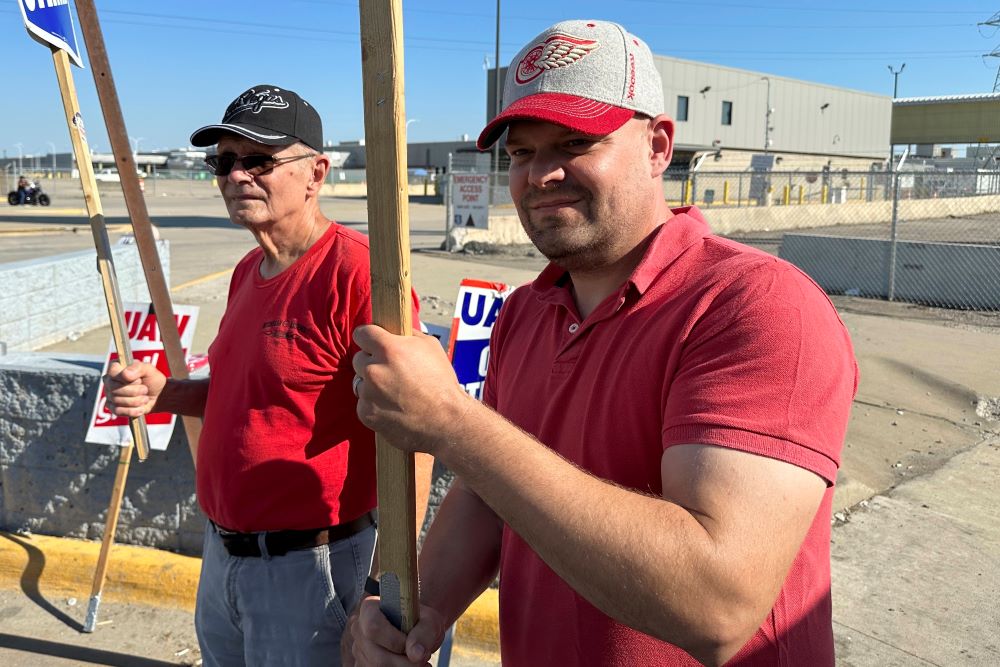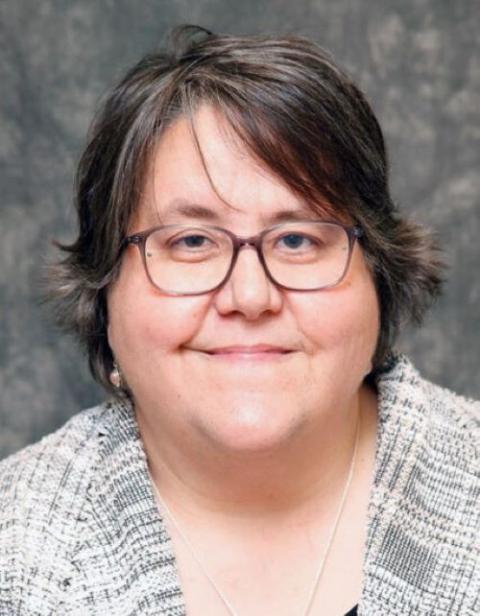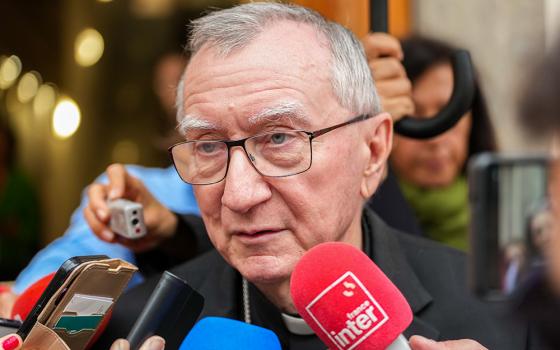
Striking United Auto Workers member Chris Jedrzejek, right, and his father picket outside Ford Motor Co.'s Michigan Assembly Plant Oct. 2, 2023, in Wayne, Mich. The Sisters of St. Joseph of Peace were unsuccessful in their effort to include in Ford Motor's annual meeting a proposal that the company stop fighting unionizing efforts at its new battery plants. (AP/Mike Householder)
The corporate annual shareholder meeting season has come to a close, and once again Catholic sisters were heavily involved in working to force corporate reforms.
Publicly traded companies are required to hold an annual meeting — most are held in the spring — where company executives discuss plans, proposals and profits with the owners of the corporation: the shareholders.
Since the 1970s, sisters have been buying the minimum shares of stock required to give them a voice in corporate governance, typically $2,000 worth. Their shares allow them to put forth proposals for all shareholders to vote on at annual meetings. Recent years have seen sisters work to eliminate human labor trafficking or abuse of workers from company supply chains, seek reforms in corporate governance, push for climate initiatives, urge racial equity efforts, and rein in sales of firearms.
"It's what we're supposed to be doing at this time," said Sr. Susan Francois, a member of the Sisters of St. Joseph of Peace and vice chair of the Investor Advocates for Social Justice. "When a sister is in the dialogue, they listen differently."
The Sisters of St. Joseph of Peace this year put forth a proposal to require Ford Motor Co. to stop fighting unionizing efforts at its new battery plants and to work with local residents who would be impacted by the new factories. The U.S. Securities and Exchange Commission accepted Ford's request to remove the proposal, so it never went to a vote. Religious of the Sacred Heart of Mary co-filed the request.
"But we're still at the table and we're still raising the voices of the local community," Francois said. "We just want the neighbors to be in dialogue with Ford."
IASJ, formerly the Tri-State Coalition for Responsible Investing, was started by congregations of religious in Connecticut, New York and New Jersey in 1975.

Sr. Susan Francois (Courtesy photo)
Even when sisters’ proposals fail, they often get corporate executives to the table to at least consider the ideas, and reforms often are made before the shareholder proposal process even begins. Sisters see the public proposal as a last resort when companies refuse to even consider the changes they're seeking.
"We try not to go the resolution route," Francois said. "But anything we can do to be creative in this space is part of our call."
Sometimes, even a proposal that doesn't pass is seen as a victory, because it keeps the issue on the table, in the public eye, and on the mind of shareholders who could eventually see the issue as a liability for the company and a danger to profits.
Even if a proposal passes, the votes are advisory and the corporation has no legal obligation to recognize it.
"It could get 100% and the board doesn't have to do it," Francois said. "But it's moving the barometer and raising where the ethical bar is."
Last year, for example, a shareholder's resolution led by the Sisters of St. Joseph of Peace won 26% of the vote at Citigroup's annual meeting, enough to be able to file the resolution again this year — the fourth year in a row. The resolution calls for Citigroup, one of the largest investment banks in the world, to examine its efforts to respect the human rights of Indigenous people in the projects it finances and invests in.
This year, the proposal received only 16% of the vote, but Francois said it was worth it, because the proposal was presented by Olivia Bisa Tirko, president of the Chapra Nation in the Peruvian Amazon.
"This was the third year in a row they had an Indigenous person affected by their financing speak to them about how it affects them," Francois said. "That in and of itself made all the hullabaloo worth it."
Of the 12 proposals tracked by the IASJ, three were withdrawn after negotiations with corporate officials, one was rejected, and the others all got less than 16% of the vote.
"It's symbolically important that a group of women religious, who have taken a vow of poverty, have chosen to take action on these issues," Francois said.
Advertisement
Sisters initiated or supported proposals this year for the annual meetings of Chevron, Citigroup, Ford, Hershey, JPMorgan, Lockheed Martin, Microsoft and others. Their proposals addressed issues that included human rights, workers' rights, Indigenous peoples' rights and environmental justice.
One newer issue sisters are working for is for votes to be disclosed by the class of shares. Insiders often own preferred shares of stock that have much more voting power than common shares. That means a handful of people can outvote thousands of common shareholders. A proposal for Tyson Foods, Inc., for example, was supported by almost 58% of independent shareholders, according to IASJ, but failed with only 13% of the total vote due to preferred shares that each count for multiple votes.
A resolution by the American Baptist Home Mission Societies for Hershey to disclose vote results by share class was withdrawn after corporate officials agreed to the idea.







